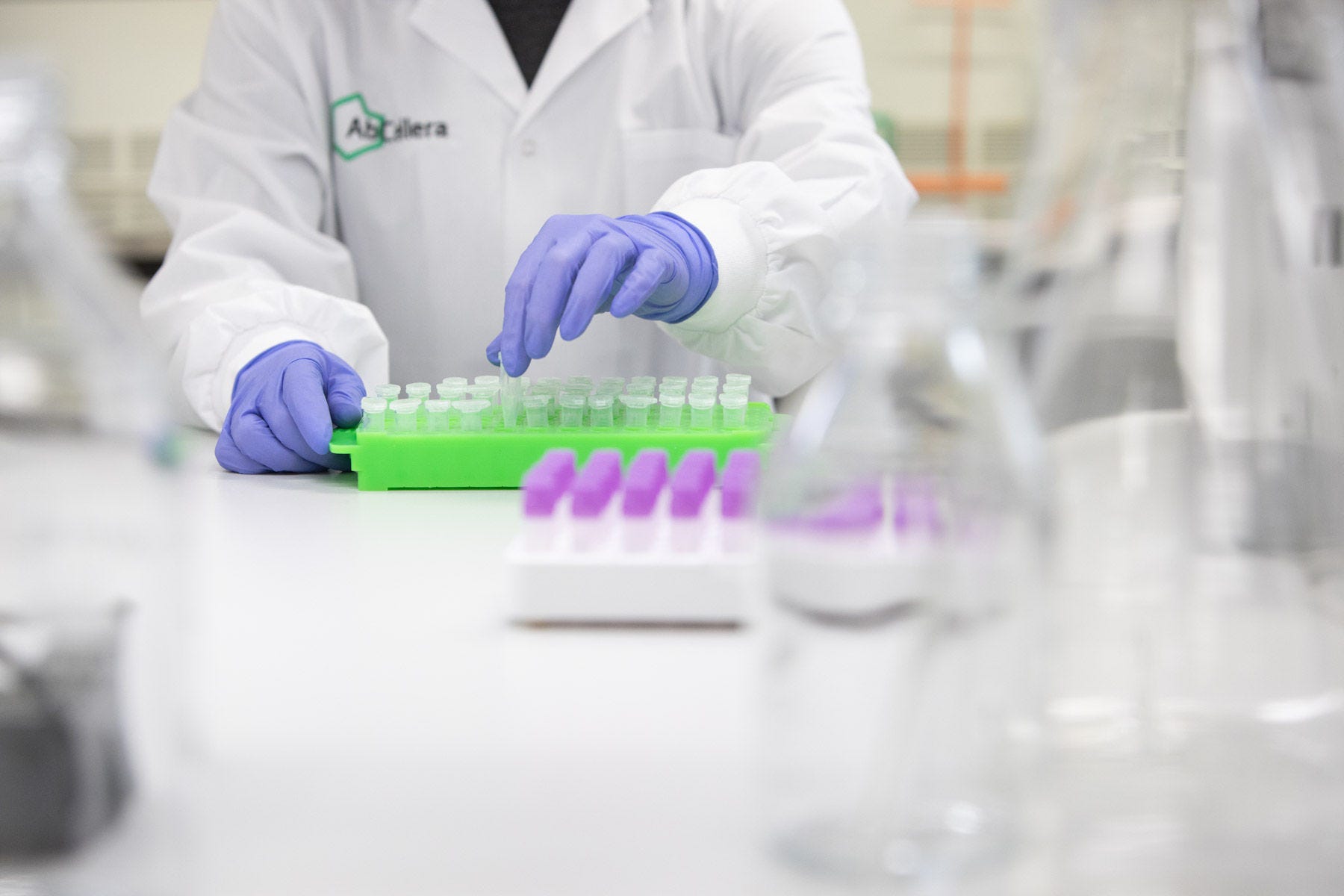Skovronsky: Lilly Aims to Test COVID-19 Therapy by Summer
 Reagents are prepared for a molecular biology assay at an AbCellera lab.
Reagents are prepared for a molecular biology assay at an AbCellera lab.
Subscriber Benefit
As a subscriber you can listen to articles at work, in the car, or while you work out. Subscribe NowHome to pharmaceutical giant Eli Lilly and Company (NYSE: LLY), Indiana is a contender in the race to discover a treatment for COVID-19. The company is currently working on three potential therapies, but leaders say the most important project—considering its potential impact—is its effort to develop an antibody therapy with a Canada-based startup recently named one of the world’s most innovative companies. Some of the most critically ill COVID-19 patients are already receiving antibodies via blood donations from people who have beat the virus, but Lilly envisions stepping on the gas pedal by mass producing warrior antibodies.
“Antibodies are our own immune system’s response to invaders. When the immune system sees something that doesn’t belong there, it creates an antibody…to bind up [the invader] and let the immune system dispose of it,” says Lilly Chief Scientific Officer Dr. Daniel Skovronsky.
Lilly has joined forces with Vancouver-based AbCellera, a startup that specializes in making antibody drugs and was named one of Fast Company’s Most Innovative Companies for 2020. While humans make antibodies naturally, they can also be made in a laboratory and then mass produced. Hoosier COVID-19 patients are already receiving donated plasma from others who have recovered from the virus.
“What we’re doing is sort of making that a very scientific and industrialized process, where we look for the very, very best antibodies we can find, then mass produce just those and not rely on individual donors in the future,” says Skovronsky.
AbCellera obtained a blood sample from one of the first U.S. patients who recovered from COVID-19, which gave the two companies a head start in developing an antibody therapy. Approximately 45 days into what the team estimates to be about a four-month process, the partners have already moved on to the “next generation” of antibodies from other patients. But Skovronsky cautions it’s a delicate balance; “speed is so critical,” but the team also needs a bit of time to find the best antibody possible.
“There’s always this thought that, Antibody A might be ready today, but if we push it forward, maybe it’s not quite as good [as Antibody B]. We might have something that helps less people with Antibody B, but it may be better. It’s those kinds of decisions that we’re making on a day-to-day basis,” says Skovronsky. “When we have a solution, we want it to be available for as many patients as possible, and the better the antibody, the lower the dose you need. And given manufacturing capacities, the more patients you can help.”
Skovronsky says the project is on track to be testing potential new therapies in patients in the next two to three months. While a vaccine would be a more permanent solution for COVID-19, an antibody therapy could be a powerful weapon in the meantime. He says various pharmaceutical companies are working at a feverish pace to discover solutions that capitalize on their individual expertise and avoid overlap; those that specialize in vaccines are concentrating on that area, Lilly is digging into this antibody therapy, and others are focusing on small molecule drugs.
“We’re each playing to what capabilities we have…so we cover a lot of different ideas about how to fight the virus—hoping more than one of them will be successful,” says Skovronsky. “That is different than how we sometimes operate, which is the science opens up in a particular disease, and all the companies race to see who can make the best drug the fastest against a particular target. Here, I think we’re all trying to spread out and cover the landscape of therapeutics against COVID-19.”
Lilly is deploying two other potential treatments for COVID-19. In partnership with the National Institutes of Health, Lilly is studying baricitinib, a rheumatoid arthritis drug, as a potential treatment for hospitalized COVID-19 patients. The company is also further testing an investigational antibody against Angiopoietin 2 in pneumonia patients hospitalized with COVID-19 who are at a higher risk of progressing to acute respiratory distress syndrome.
“I’ve been talking to a lot of people in the [pharmaceutical] industry, and we all feel privileged and empowered that we can take these actions to try to develop therapeutics. We’re all motivated in this industry by the same thing, which is to make a difference for people; this is not about economics at all,” says Skovronsky. “There’s a lot of good that’s coming out of this; we’re learning how to work faster and more collaboratively to fight this threat. Everyone in this industry is trying hard, and hopefully, one of us will be successful.”
Although it typically takes years for a new antibody therapy to reach the clinic, Skovronsky says the team could be testing potential antibody therapies for COVID-19 in patients by mid-July.
Skovronsky says Lilly chose to partner with AbCellera, in particular, because the startup offered the advantage of speed.
